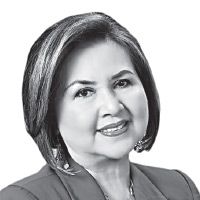Their courage set their people free - the Magsaysay Awardees 2013 (Part I)

Once more last August 31, the Ramon Magsaysay Award Board of Trustees presented the 2013 crop of awardees at the Cultural Center of the Philippines.
Ramon Magsaysay’s fame started when he was Secretary of Defense at the height of the communist rebellion in the country. He offered the rebels a chance to have a new life, inviting them to cultivate their own farms in the rich land of Mindanao. Their leader Luis Taruc believed in him so the Huks then returned to the fold. This catapulted “Monching“ to the presidency. As the third president of the Republic of the Philippines, he dedicated himself to the credo: “I believe that that a high and unwavering sense of morality should pervade all spheres of government activity.â€
Now on its 55th anniversary, it counts 50 awardees for government service, 57 for public service, 60 for community leadership, 50 for journalism, literature and creative communication arts, 46 for peace and international understanding, 13 for emergent leadership, plus a crop of 27 in the last five years. During his opening remarks, chairman of the Board Juan B. Santos wondered if these 303 heroic men and women, majority of whom are Asian, still mean anything to the IT young generation who are wired to a different set of idols in the worldwide social media.
Most of us are convinced that within the deepest recesses of every person’s heart, lies the divine spirit of God. We need our 21st Century Heroes to invigorate the souls of the Asian youth who yearn and strive for greatness while they are still in the process of becoming. To create an environment of real heroes is the delicate mission of the media today.
Dr. Ernesto Domingo’s discovery that prevents liver cancer from infancy
The nation’s poor are effectively deprived of access to quality and affordable health care, and suffer starkly higher mortality from preventable and treatable diseases.
Ernesto Domingo, a seventy-six year-old physician, specializes in hepatology and gastroenterology, Domingo has devoted over four decades to the University of the Philippines-Manila (UPM) as researcher, teacher, chancellor, and university professor meritus. He organized the UPM Liver Study Group and led in groundbreaking studies of viral hepatitis and liver disease.
By determining as well the preventive solution to liver cancer – the immunization of newborns against hepatitis-B within 24 hours from birth reduces the probability of acquiring hepatitis by 95 percent – his research has saved millions of people from the danger of life-threatening illness, and reduced health care cost. Deeply concerned about the poor’s access to health care, he has pushed for hepatitis vaccination to be mandatory and available to all. Working closely with legislators, he has also successfully lobbied for a law that ensures annual budgetary support for neonatal hepatitis immunization.
Why can’t we have a ‘Korupsi’ eradication commission like Indonesia?
Indonesia for many years ranked among “the most corrupt countries in the world.†Amid the collapse of the 32-year Soeharto regime, Indonesians decided that they had enough, and resolved to take the problem by the horns.
Komisi Pemberantasan Korupsi (KPK) is enabled by a strongly-crafted law premised on the conviction that corruption is an extraordinary problem that needs to be tackled by extraordinary means. It conducts searches and seizures, freeze assets, impose travel bans, compel cooperation from government agencies, and even intercept communications without prior judicial approval. Its powers are such that a civic leader remarked, upon the law’s passage, that politicians were “inviting a tiger into their house.â€
From 2003 to 2012, KPK has handled 332 high-profile cases involving top government officials; of these, 169 cases have been processed in court, and KPK has chalked up an amazing 100% conviction rate. KPK has returned to the state treasury recovered assets worth Rp. 805.6 billion, or more than $80 million.
KPK has its crises, including harassment and intimidation. KPK has also built up a formidable base of public support. When it locked horns with the national police, thousands staged public demonstrations supporting KPK. When the parliament refused to allocate money for much-needed KPK building, Indonesian citizens voluntarily donated money for the building construction. Now on its tenth year, KPK has become a symbol of reform and hope for Indonesians, and is hailed as one of the few effective anti-corruption agencies in the world.
Lahpai Seng Raw’s amazing courage to work with government and rebels
Myanmar has suffered decades of ethnic strife in the world’s longest-running civil war, and 50 years of brutal military dictatorship that isolated the country, turning it into one of the least developed in the world. After the general elections in 2010, Myanmar has taken its first uncertain steps towards a more open and democratic future. It instituted a civilian government.
A 64-year-old widow and member of the Kachin ethnic minority, Lahpai Sen Raw is at the forefront in facing these challenges. A student of psychology at Yangon University, she personally experienced the military’s abusive rule when she was detained on the suspicion of involvement in the Kachim insurgency with her brother. In 1987 to 1997, she began to involve herself in relief work for internally displaced peoples in the Myanmar-China border as well as Bangkok, where she became the development officer-in-charge in ROKA, the Kachin Independence Organization’s humanitarian wing. With the help of faith based groups and non government organizations (NGOs), Seng Raw took the bold step of establishing, in military-ruled Burma, the NGO “Metta Development Foundation,†which addressed the problems of population displacement of over 70,000 people in the country’s conflict zones.
Its long-term interventions consist of establishing more than 600 farmer field schools (FFS), capacitating over 50,000 farmers in improved farm and forest management; established training centers in early childhood education, and introduced community-managed water, health and sanitation systems, and other health care projects. In 2008, when tropical cyclone Nargis devastated Myanmar – it took the lead in a massive rehabilitation, reconstruction, and development effort that covered large sections of the country and benefited hundreds of thousands of cyclone victims. Metta has now grown to be the largest NGO in Myanmar, with a staff of 600, and three research and training centers. Its various programs have reached over 600,000 people in 2, 352 communities.
Working in a war-torn and socially fractured country, Seng Raw has shown both amazing courage and a unique ability to work with both government and rebels.
Magsaysay’s credo
I believe that government starts at the bottom and moves upward, for government exists for the welfare of the masses of the nation.
I believe that he who has less in life should have more in law.
I believe that the little man is fundamentally entitled to a little bit more food in his stomach, a little more cloth on his back and a little more roof over his head.
I believe that this nation is endowed with a vibrant and stout heart, and possess untapped capabilities and incredible resiliency.
(Part II – Anti-Trafficking Heroine and Lady Governor in Taliban-Ruled Afghanistan)
(For feedback email at precious.soliven@yahoo.com)
- Latest
- Trending



















